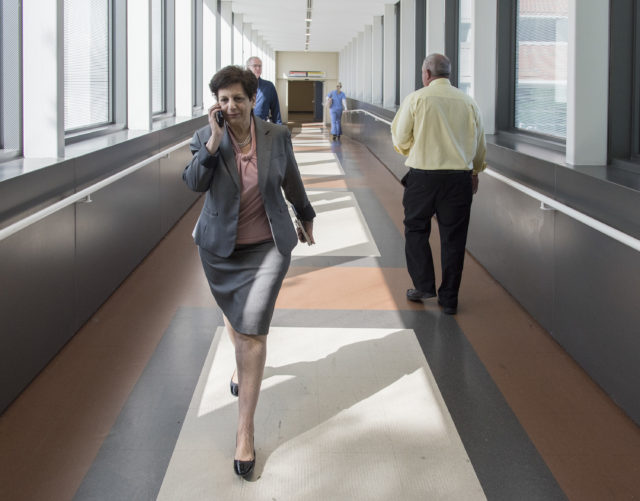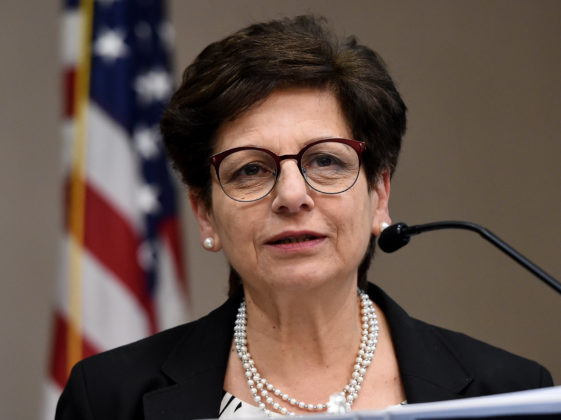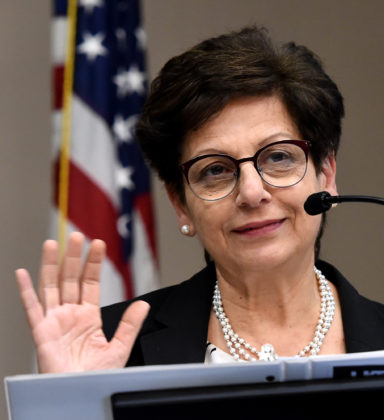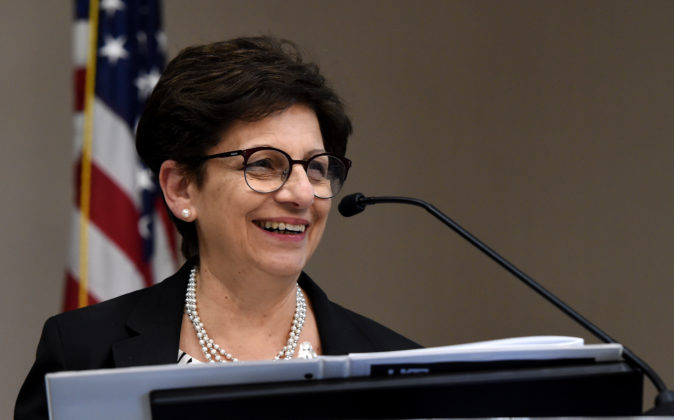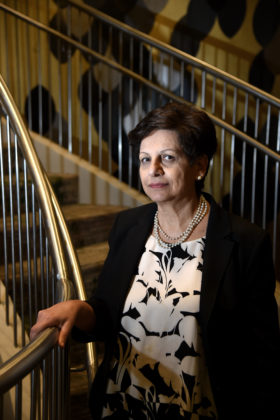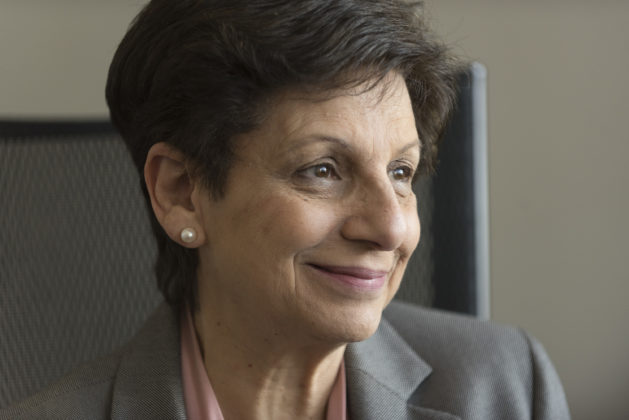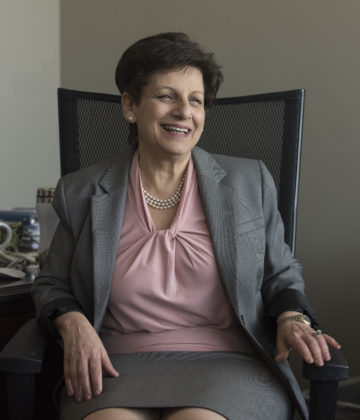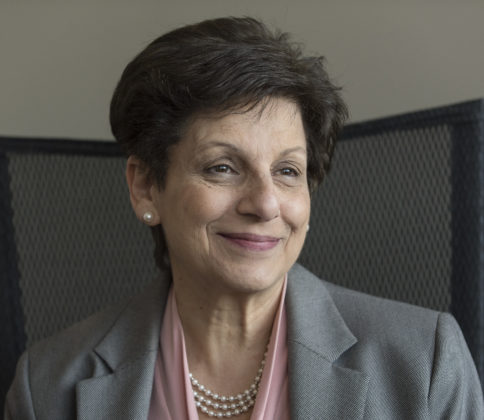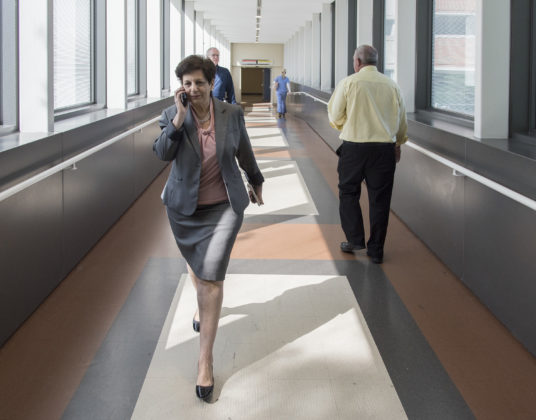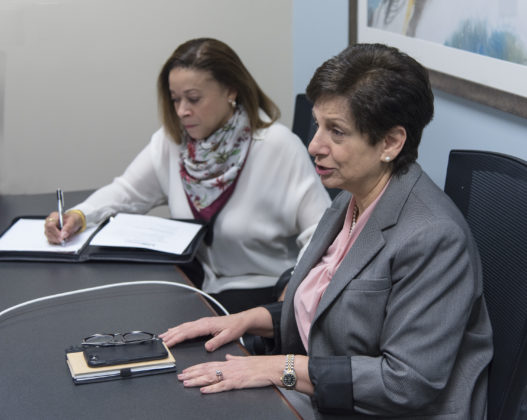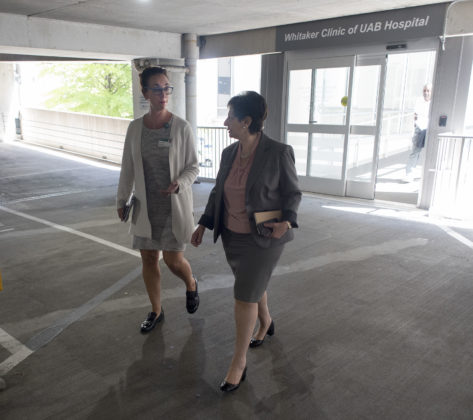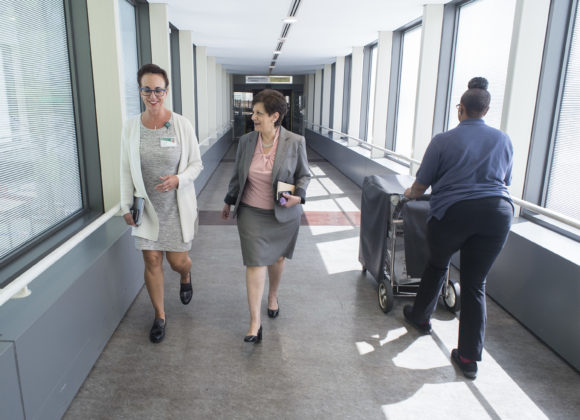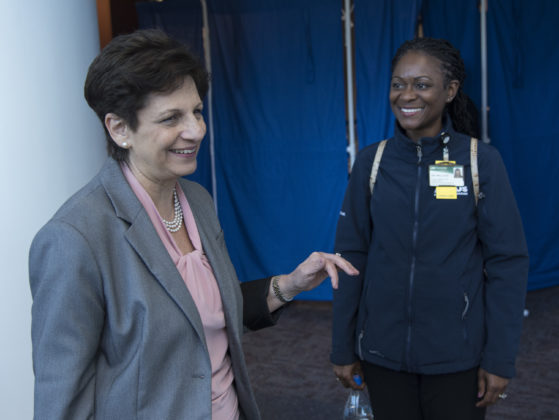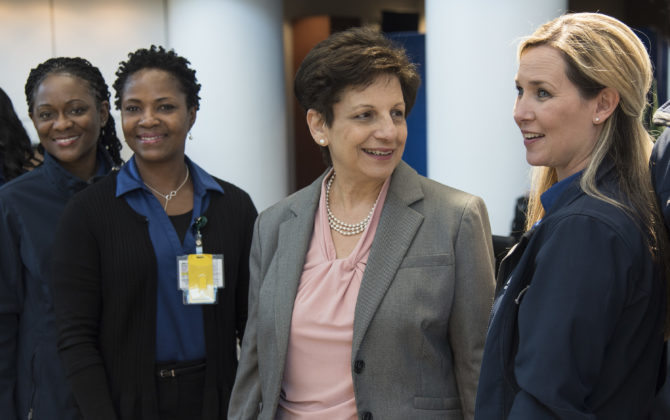By Ameera Steward
The Birmingham Times
On the 12th floor of the University of Alabama at Birmingham (UAB) Faculty Office Tower is the office of a woman who seldom is there. Mona Fouad, MD, one of the most influential medical professionals in the state of Alabama, spends only about a third of her time in an office (she has another one on the sixth floor of the same building that overlooks the city of Birmingham). Most of the time, she is out and about with her students and colleagues and in the communities she serves.
Last week, she was invited to a roundtable discussion with Ben Carson, MD, accomplished neurosurgeon and current U.S. Secretary of Housing and Urban Development, at the Campus of Hope in the Marks Village Public Housing community.
In March, she delivered the UAB Distinguished Faculty Lecture, the highest honor bestowed by the school’s Academic Health Center on a faculty member who has advanced the frontiers of science and made outstanding contributions to education, research, and public service.
The Birmingham Times had the rare opportunity to experience a day in the life of Fouad. Despite her busy schedule, she welcomed us into her often-vacant 12th-floor office, where her energy, her smile, her presence enhanced the light streaming through the horizontal windows.
“I feel like … a facilitator and a supporter because I work with a lot of intelligent people,” Fouad said. “I guide people to get to the max of their ability, and I love to see people succeed, be creative, and accomplish what they have in their hearts. … When I see that, when I see someone succeed, when I see someone grow, when I see one of our projects make an impact, … make people healthy or give them a better quality of life, I feel like that’s my mission—that’s what I feel I am doing every day.”
Fouad is a professor in and director of the UAB Division of Preventive Medicine (DOPM), founding director of the UAB Minority Health and Health Disparities Research Center (MHRC), and senior associate dean for diversity and inclusion for the UAB School of Medicine. In addition to her roles at UAB, she is recognized nationally and internationally for her work in the medical field and was elected to the National Academy of Medicine in 2017.
Throughout her career, Fouad has received tens of millions of dollars in funding and served on dozens of national and international committees. She [also] has published more than 130 peer-reviewed manuscripts, book chapters, and abstracts; delivered more than 50 conference presentations and lectures; and led more than 50 research projects as principal investigator.
Early Riser
Fouad’s days can begin as early as 5:30 a.m., which is when she starts answering emails. She arrives at UAB between 7 a.m. and 8 a.m. for meetings and conference calls. She’s usually on campus closer to 7, she said, “because that’s the time … people who have clinics can do that.”
Her days are filled with writing grants, as well as lots and lots of meetings, site visits to places like the Kingston community in Birmingham, or stops in rural Alabama: “Sometimes I have to travel to Washington, D.C., for NIH meetings,” she said, of the National Institutes of Health.
Fouad never seems rushed or in a hurry, but she is always prompt. En route to a 10 a.m. Learning Opportunities for Women meeting, she meets a colleague, at which time she also takes a phone call about a change of plans, including inviting the caller to her meeting. She arrives at her destination, where she serves as one of six women brainstorming about how to provide opportunities for women.
“What we were trying to do is to coordinate the activities happening in UAB Medicine, like in our health system and our school of medicine, that focus on … the advancement of women faculty and staff,” Fouad said.
During the 10 a.m. meeting, Fouad fit in seamlessly, not in her role as senior associate dean for diversity and inclusion for the School of Medicine, but as a member of the team. The women listened to one another and gave feedback as they talked about responsibilities for the next meeting. Learning Opportunities for Women meetings last 50 minutes to an hour, and the group plans to gather monthly or every other month.
“This is actually [a] forward step because we’re getting more organized to coordinate all the things related to women employed [at UAB],” said Fouad.
Humble Beginnings
Fouad earned her medical degree from Alexandria University in Alexandria, Egypt, in 1977 and her Master of Public Health degree from UAB in 1986. In 1980, she and her husband, Fouad H. Fouad, PhD, moved from Egypt to Texas, where he earned a doctorate in civil engineering from Texas Agricultural and Mechanical University; he is now a professor in and chair of the UAB Department of Civil Engineering.
At the time, Fouad, who had two young daughters (they were born two years apart and are now in their early 30s) did not work during her first four or five years in the U.S. because, she said, “I wanted to be close to them.”
Around 1986, Fouad started attending UAB, where she studied epidemiology and public health. In 1990, she began working for the UAB Division of Preventive Medicine (DOPM).
“It turned to be really good for my husband and for me,” she said. “We came at a time when UAB was growing … a lot of their programs in many areas—in medicine, in engineering, in business—and we were at the beginning of our careers. It was a great opportunity. Our careers picked up and grew [along with] UAB …, so we didn’t feel like we needed to go anywhere else.”
One of the things Fouad noticed when she first arrived in Birmingham—and what would become her focus—was “how there are people that [are] very healthy and … some communities that [are] not. [That] was unexpected. … Coming from a developing country, I thought only developing countries had these issues.”
Fouad had worked for a year in rural Egypt, where the structure includes “physicians for a county or village … and public health units,” she explained. “I was the physician in charge of a public health unit in rural Egypt.”
She didn’t expect to see the same conditions in the U.S., but when she did and then decided to stay, she said she was going to make a difference.
First, Fouad had to adjust to the environment—or the environment had to adjust to her.
She was a physician, but it was still difficult to find work. She proved herself by volunteering for almost a year in the DOPM filing room “just for people to know who I am and what my capabilities are,” she said.
“I wanted people to see me, to see the things I was able to do, so I took whatever job. First, [I] volunteered … for a year. When I needed the money, I said, ‘OK, now give me a job.’ There was nothing there except a staff job, so I coordinated studies [and took on other tasks] until … a research opportunity came up. I said, ‘I can apply for these grants. I can bring in money from the NIH.’ … So, I had to do two years of work outside my [field]. … [Even though] I had MD and Master of Public Health degrees, I still [volunteered].”
The experience of volunteering and working her way up proved invaluable for Fouad: “[It] made me understand and respect every kind of work that’s happening in the division on every level because I did it, too,” she said.
Widely Recognized
Fouad’s reach and recognition are far and wide.
She was one of the UAB doctors who in 2002 founded the MHRC, a comprehensive research, training, and community-engagement center to reduce health disparities of vulnerable populations and disadvantaged communities. Fouad still serves as its director.
“We wanted to establish a center for a more comprehensive approach—to bring other disciplines together, from the School of Medicine to the schools of Nursing and Public Health and the College of Arts and Sciences,” Fouad told the UAB Reporter in a recent interview. “We wanted to bring scientists together. Health disparities are not determined just by behavior; it can also be impacted by social and economic, as well as biological and environmental factors. Both a person’s DNA code and ZIP code matter.”
Since its founding, the MHRC has received more than $188 million from the NIH in health disparities-related research funding and launched a slew of programming, including training for students from [several historically black colleges and universities (HBCUs)], including the Morehouse School of Medicine, Tuskegee University, Alabama Agricultural and Mechanical University, Alabama State University, Oakwood University, and Stillman College, according to the UAB Reporter.
Tiffany Osborne, MHRC Community Engagement Director, said Fouad’s passion makes her special.
“She truly cares about the individuals living in the underserved communities we work in, and she carries it with her. She fights, … she plans, she strategizes, she prays for them,” Osborne said. “She gets it, and she knows the messaging that will resonate with potential funders and in grant opportunities that will bring in resources to help us impact those communities. It’s not just work for her. … It’s her life’s passion.”
MHRC Communications Manager Laura Heider said Fouad’s work can be seen in “actual lives of real people. “
“[Her work] is not abstract, … not theoretical; it’s real, it’s concrete, and it’s immediate. People who are living right now are enjoying the fruits of her labor. Their lives are better because of the work she does.”
Away from the Office
When she’s away from the office, Fouad loves to read “any books I can put my hand on,” she said, adding that she enjoys books on management.
“Our school of medicine, our dean, and my department chair like to share career-development and management books,” said Fouad, who is currently reading “The Ideal Team Player” by Patrick Lencioni.
To relax and get her mind off work, she sometimes reads news on her iPad, particularly on the BBC app, which often features health stories she enjoys, “so I don’t dream [of] work stuff when I sleep,” she said.
She also checks Facebook periodically: “I almost never post anything on Facebook, but I read to see what my friends … [are] doing and what’s happening,” she said. “[I also look] at nice cooking recipes, which I always save. I don’t have time to make them, but I keep sending them to myself.”
Fouad doesn’t watch much television, just maybe a half-hour in the evening. Her television is not in the bedroom because, she said, “I feel like it’s very stressful. It’s all bad news and you don’t want that.”
She doesn’t have time for hobbies because of her love for and the time she spends with her five grandchildren, who she sees whenever she can during weekends.
“I have to see them … and make sure at least I spend time with them,” she said.
The weekend is also Fouad’s time for errands and housework: “I go and get my groceries, … shop a little bit, see the grandkids, go to church, and then cook because I don’t cook in the middle of the week,” she said, adding that she sometimes takes weekend trips to browse at Home Goods.
“[I sometimes go] even if I don’t need anything. It’s just so relaxing to see [what’s in the store]. … They have little nice things.”
Grateful
Back at UAB, Fouad’s day ends around 6 or 6:30 p.m., which is great for her because she goes to bed early. After reading a few non-work-related news articles and new recipes, she turns in around 10 p.m., so she can be ready for the next day—and every day is different for her and her team.
“We don’t have boring jobs,” Fouad said. “No one is bored because we never know what’s going to happen.”
That’s just fine with Fouad, though, because she genuinely loves what she does.
Spending time with Fouad is to observe a person who is very humble, a person who is very grateful to God for her success and the success of the MHRC team.
“A lot of people made this happen. It’s not just me,” Fouad said.
The UAB Reporter (https://www.uab.edu/reporter/people/awards-honors/item/8645-mona-fouad-is-2018-distinguished-faculty-lecturer) contributed to this article.
Click here to read more stories about Dr. Mona Fouad and UAB.

